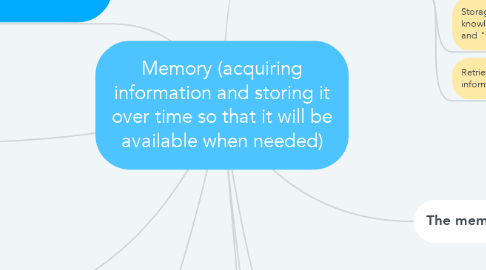Memory (acquiring information and storing it over time so that it will be available when needed)
by Vy Vy


1. Association Networks (a memory system that organizes individual units of information according to some set of relationship; may include such concepts as brands, manufacturers, and stores)
1.1. activation models of memory (approaches to memory stressing different levels of processing that occur and activate some aspects of memory rather than others, depending on the nature of the processing task)
2. Spreading Activation (allow us to shift back and forth among levels of meaning)
2.1. brand specific (memory is stored in terms of claims the brand makes)
2.2. ad specific (memory is stored in terms of the medium or content of the ad itself)
2.3. brand identification (memory is stored in terms of the brand name)
2.4. product category (memory is stored in terms of how the product works or where it should be used)
2.5. evaluative reactions (memory is stored as positive or negative emotions)
3. The Marketing Power of Nostalgia
3.1. nostalgia (describes the bittersweet emotion that rises when we view the past with both sadness and longing
3.2. retro brand (an updated version of a brand from a prior historical period)
4. Response bias (a form of contamination in survey research in which some factor, such as the desire to make a good impression on the experimenter, leads respondents to modify their true answers)
5. Hybrid ads (that include a program tie - in deliver similar results)
6. Information Processing Approach
6.1. Encoding (the stage that information enters in a way the system will recognize)
6.1.1. sensory memory (stores the information we receive from our senses)
6.1.2. episodic memory (relate to events that are personally relevant)
6.1.3. narrative (memories store information we acquire in story form)
6.2. Storage (the stage that we integrate this knowledge with what is already in memory and "warehouse" it until it is needed)
6.3. Retrieval (the process whereby we recover information from the long - term memory)
7. The memory Process
7.1. sensory memory
7.2. attention
7.3. short - term memory (also stores information for a limited period of time, and it has limited capacity)
7.3.1. chunking (a configuration that is familiar to the person and that he or she can think about as a unit)
7.4. long - term memory (the system that allows us to retain information for a long period of time)
7.4.1. elaborative rehearsal (a cognitive process that allows information to move from short - term memory into long - term memory by thinking about the meaning of a stimulus and relating it to other information already memory)
